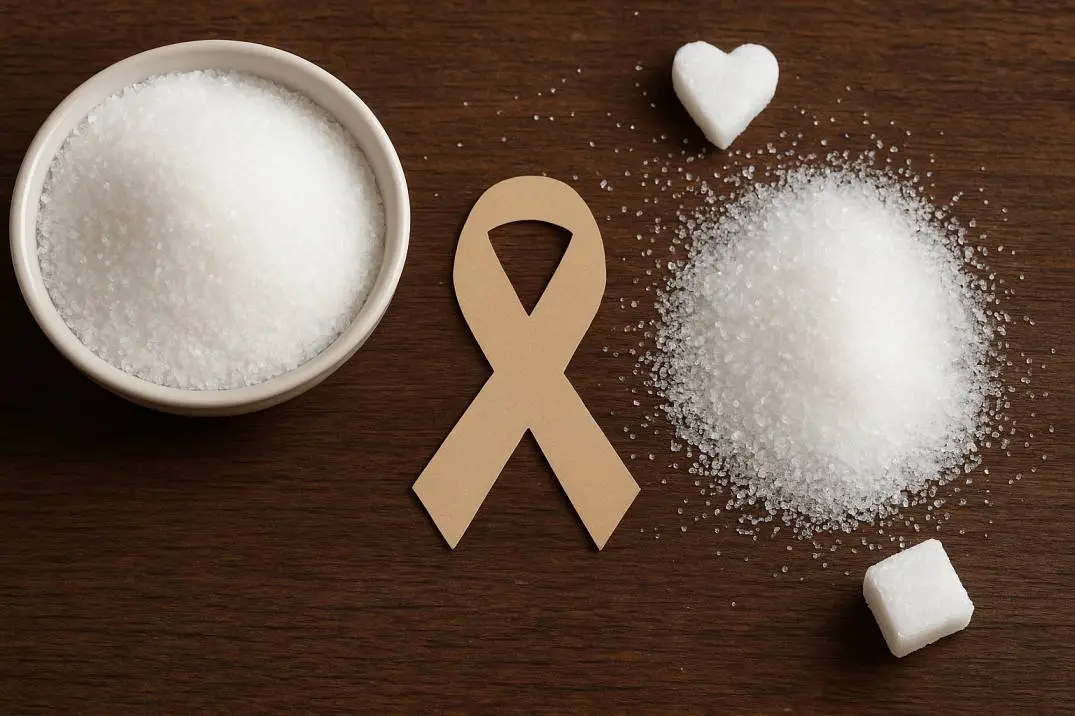Sugar and Cancer: Does It Really Promote Cancer?
The relationship between sugar and cancer has sparked countless debates and concerns. It’s common to hear claims that sugar “feeds” cancer or that cutting sugar completely from your diet can prevent cancer altogether.
But is there any truth to these claims, or are they based on misconceptions? This blog will explore the science behind sugar and its connection to cancer, clear up myths, and provide practical advice on maintaining a healthy lifestyle.

Understanding Sugar and Its Role in the Body
Sugar, or glucose, is a type of carbohydrate and a primary source of energy for your body. It’s found naturally in foods like fruits, vegetables, and dairy, and is also added to many processed foods under names like sucrose, high-fructose corn syrup, and others.
When you eat food containing carbohydrates, your body breaks them down into glucose, which is absorbed into the bloodstream. From there, glucose travels to your cells, where it’s used to fuel everything from your brain to your muscles. Without glucose, your body wouldn’t be able to function properly.
However, this essential role has led to misunderstandings about sugar’s impact on cancer. To address whether sugar directly fuels cancer growth, we must look closer at how cancer cells behave.
Does Sugar “Feed” Cancer?
Cancer cells grow and divide rapidly, often requiring a significant amount of energy. They use glucose as fuel, just like healthy cells do. This fact has led to the widespread belief that consuming sugar might accelerate cancer growth. However, the reality is more complicated.
While it’s true that cancer cells consume glucose, cutting sugar out of your diet won’t “starve” them. Your body is incredibly efficient at regulating blood glucose levels and will produce glucose from other sources, like proteins and fats, if needed. This process ensures that both healthy and cancerous cells have access to energy, regardless of sugar intake.
There’s no evidence to suggest that eating sugar directly causes cancer or makes it grow faster. That said, there are indirect ways in which excessive sugar consumption might influence cancer risk.
The Indirect Link Between Sugar and Cancer
The concern around sugar and cancer often stems from its role in broader health issues rather than its direct effect on cancer cells. Here’s how:
1. Obesity and Cancer Risk
Excessive sugar consumption can contribute to weight gain and obesity, especially when combined with other unhealthy eating habits. Obesity is a well-known risk factor for several types of cancer, including breast, colon cancer and pancreatic cancer.
This is partly because excess body fat can lead to chronic inflammation and hormonal changes, which may increase cancer risk.
2. Insulin Resistance and Diabetes
A diet high in added sugars can lead to insulin resistance, where your body’s cells become less responsive to insulin. Insulin is a hormone that helps regulate blood sugar levels, and when it’s not working effectively, it can lead to type 2 diabetes. Studies show that insulin resistance and type 2 diabetes are associated with a higher risk of certain cancers.
3. Inflammation
Sugary diets can contribute to chronic low-grade inflammation in the body, which is believed to be a factor in cancer development. Chronic inflammation can damage tissues over time, creating an environment where cancer cells are more likely to thrive.
Myths and Misconceptions About Sugar and Cancer
Myth 1: Cutting Out Sugar Starves Cancer Cells
As mentioned earlier, your body can produce glucose from other sources, so eliminating sugar from your diet won’t deprive cancer cells of energy. What’s more, a no-sugar diet can be unsustainable and lead to nutrient deficiencies if not carefully managed.
Myth 2: All Sugars Are Bad
Natural sugars found in fruits, vegetables, and dairy are packaged with essential nutrients like fiber, vitamins, and minerals. These aren’t the same as added sugars found in sugary drinks, candies, and baked goods, which offer little nutritional value.
Myth 3: Sugar Alone Causes Cancer
Cancer is a complex disease that results from a combination of genetic, environmental, and lifestyle factors. Sugar consumption, by itself, is not a direct cause of cancer.
Practical Tips for a Balanced Diet
While sugar doesn’t need to be eliminated entirely, it’s a good idea to moderate your intake for overall health. Here are some practical tips:
- Limit Added Sugars:
- Cut back on sugary drinks like sodas and energy drinks.
- Opt for unsweetened versions of foods, such as plain yogurt or oatmeal, and add natural sweeteners like fruit if needed.
- Focus on Whole Foods:
- Incorporate plenty of fruits, vegetables, whole grains, lean proteins, and healthy fats into your diet.
- Aim for a colorful plate to ensure you’re getting a range of nutrients.
- Read Labels:
- Check ingredient lists for hidden sugars. Words like glucose, fructose, and maltose are all forms of sugar.
- Stay Active:
- Pair a balanced diet with regular physical activity to maintain a healthy weight and reduce cancer risk.
- Get Screened:
- Early detection is key. Stay up to date with regular health screenings and consult your cancer doctor if you have any concerns.
Final Thoughts
The idea that sugar directly promotes cancer can be alarming, but the connection isn’t as clear-cut as it may seem. Sugar is an essential part of our diet, but moderation is key to maintaining overall health. The real focus should be on a balanced diet, healthy weight management, and other lifestyle factors that can lower your risk of developing cancer.
By staying informed and making thoughtful dietary choices, you can take positive steps toward a healthier future. If you have concerns about your diet or cancer risk, speak with a healthcare professional for personalized advice.

Dr. Aditya Kulkarni
MS, DNB, FRCS, MCh (Surgical Gastroenterology & GI Oncology)
Dr. Aditya Kulkarni is a Consultant of Laparoscopic and Robotic Gastrointestinal, Hepato-biliary-pancreatic, and Cancer Surgeon at the Renowned Oasis Surgery Clinic Pune.
